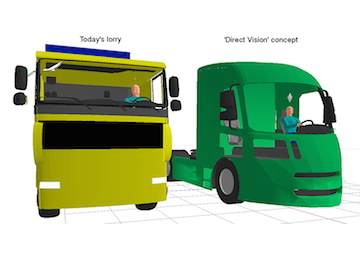
MEPs block push to delay safer lorries
MEPs and the European Commission were united in rejecting EU governments’ demand for a 10-year delay in introducing safer, cleaner lorry designs during negotiations this week.
Interested in this kind of news?
Receive them directly in your inbox. Delivered once a week.
The Commission’s proposal, supported by the Parliament, would allow – but not mandate – manufacturers to redesign lorry cabs to be more fuel-efficient and have improved safety features such as a crumble zone and much improved driver vision. MEPs want truckmakers to be able to start work on the new design immediately, but EU governments are seeking a 10-year prohibition on their introduction.
The Council’s push for a delay has been lead by France and Sweden, which are under pressure from domestic truckmakers Renault and Volvo. The companies fear competitors would be better placed to use the new design flexibility. ACEA says a delay is required to ensure ‘competitive neutrality’ but their customers, the hauliers, have demanded that safer and cleaner trucks be allowed as soon as possible.
During trilogue negotiations, MEPs stood firm on their position that manufacturers should be able to introduce new designs as soon as possible, if they choose. But the Italian presidency which negotiates on behalf of the member states, refused to make any concessions. The government representatives will discuss the issue again on 10 December, before a new attempt to reach an agreement with the Parliament and the Commission later that day. If no deal is reached with the Italian presidency, negotiations would continue in 2015.
William Todts, senior policy officer at T&E, said: ‘Parliament was 100% right to send the Council packing and it should stick to its guns even if that means no deal can be reached with the Italians. This law is about enabling safer and more efficient trucks, not mandating them, so a delay until 2025 is absurd and indefensible.’
Every year 15% of all fatal collisions in Europe – around 4,200 deaths – involve lorries. T&E estimates that a more streamlined cab along with rear flaps could also improve fuel efficiency by up to 7-10%, which would help put an end to 20 years of stagnating lorry fuel efficiency.
Separately, the lorry industry is facing a European Commission probe into whether certain truckmakers operated as a cartel in coordinating their prices and the introduction of new technologies, which would be in conflict with EU competition rules. Volvo has already set aside €400 million for a possible fine.
William Todts concluded: ‘The lorry industry stands accused of a price-fixing cartel. And now they want to keep longer and better cabins illegal for as long as possible. If regulators are serious about boosting competition and innovation, let alone safety and environment, they should reject the absurd moratorium and enable new truck designs as soon as possible.’
